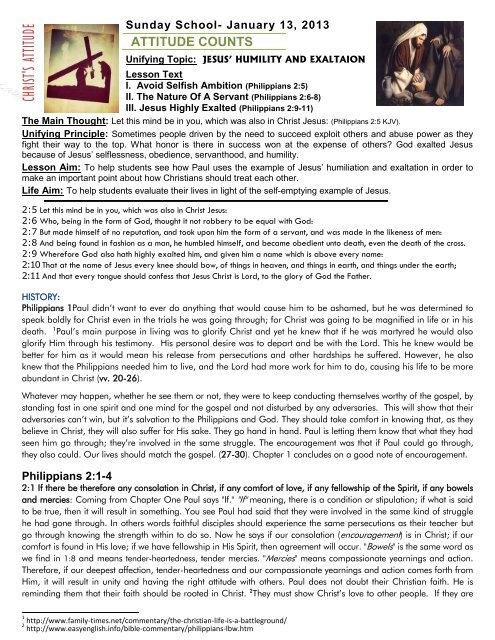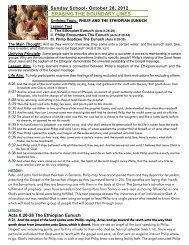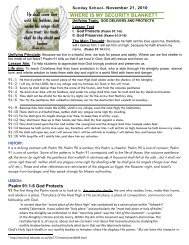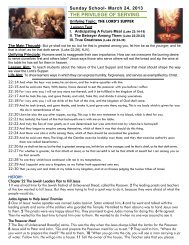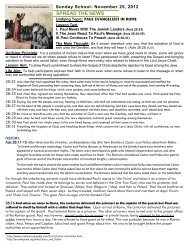1-13-2013 - Attitude Counts Philippians 2:5 - pitwm.net
1-13-2013 - Attitude Counts Philippians 2:5 - pitwm.net
1-13-2013 - Attitude Counts Philippians 2:5 - pitwm.net
Create successful ePaper yourself
Turn your PDF publications into a flip-book with our unique Google optimized e-Paper software.
Sunday School- January <strong>13</strong>, 20<strong>13</strong><br />
ATTITUDE COUNTS<br />
Unifying Topic: JESUS’ HUMILITY AND EXALTAION<br />
Lesson Text<br />
I. Avoid Selfish Ambition (<strong>Philippians</strong> 2:5)<br />
II. The Nature Of A Servant (<strong>Philippians</strong> 2:6-8)<br />
III. Jesus Highly Exalted (<strong>Philippians</strong> 2:9-11)<br />
The Main Thought: Let this mind be in you, which was also in Christ Jesus: (<strong>Philippians</strong> 2:5 KJV).<br />
Unifying Principle: Sometimes people driven by the need to succeed exploit others and abuse power as they<br />
fight their way to the top. What honor is there in success won at the expense of others? God exalted Jesus<br />
because of Jesus’ selflessness, obedience, servanthood, and humility.<br />
Lesson Aim: To help students see how Paul uses the example of Jesus’ humiliation and exaltation in order to<br />
make an important point about how Christians should treat each other.<br />
Life Aim: To help students evaluate their lives in light of the self-emptying example of Jesus.<br />
2:5 Let this mind be in you, which was also in Christ Jesus:<br />
2:6 Who, being in the form of God, thought it not robbery to be equal with God:<br />
2:7 But made himself of no reputation, and took upon him the form of a servant, and was made in the likeness of men:<br />
2:8 And being found in fashion as a man, he humbled himself, and became obedient unto death, even the death of the cross.<br />
2:9 Wherefore God also hath highly exalted him, and given him a name which is above every name:<br />
2:10 That at the name of Jesus every knee should bow, of things in heaven, and things in earth, and things under the earth;<br />
2:11 And that every tongue should confess that Jesus Christ is Lord, to the glory of God the Father.<br />
HISTORY:<br />
<strong>Philippians</strong> 1Paul didn’t want to ever do anything that would cause him to be ashamed, but he was determined to<br />
speak boldly for Christ even in the trials he was going through; for Christ was going to be magnified in life or in his<br />
death. 1 Paul’s main purpose in living was to glorify Christ and yet he knew that if he was martyred he would also<br />
glorify Him through his testimony. His personal desire was to depart and be with the Lord. This he knew would be<br />
better for him as it would mean his release from persecutions and other hardships he suffered. However, he also<br />
knew that the <strong>Philippians</strong> needed him to live, and the Lord had more work for him to do, causing his life to be more<br />
abundant in Christ (vv. 20-26).<br />
Whatever may happen, whether he see them or not, they were to keep conducting themselves worthy of the gospel, by<br />
standing fast in one spirit and one mind for the gospel and not disturbed by any adversaries. This will show that their<br />
adversaries can’t win, but it’s salvation to the <strong>Philippians</strong> and God. They should take comfort in knowing that, as they<br />
believe in Christ, they will also suffer for His sake. They go hand in hand. Paul is letting them know that what they had<br />
seen him go through; they’re involved in the same struggle. The encouragement was that if Paul could go through,<br />
they also could. Our lives should match the gospel. (27-30). Chapter 1 concludes on a good note of encouragement.<br />
<strong>Philippians</strong> 2:1-4<br />
2:1 If there be therefore any consolation in Christ, if any comfort of love, if any fellowship of the Spirit, if any bowels<br />
and mercies: Coming from Chapter One Paul says "If." "If" meaning, there is a condition or stipulation; if what is said<br />
to be true, then it will result in something. You see Paul had said that they were involved in the same kind of struggle<br />
he had gone through. In others words faithful disciples should experience the same persecutions as their teacher but<br />
go through knowing the strength within to do so. Now he says if our consolation (encouragement) is in Christ; if our<br />
comfort is found in His love; if we have fellowship in His Spirit, then agreement will occur. "Bowels" is the same word as<br />
we find in 1:8 and means tender-heartedness, tender mercies. "Mercies" means compassionate yearnings and action.<br />
Therefore, if our deepest affection, tender-heartedness and our compassionate yearnings and action comes forth from<br />
Him, it will result in unity and having the right attitude with others. Paul does not doubt their Christian faith. He is<br />
reminding them that their faith should be rooted in Christ. 2 They must show Christ’s love to other people. If they are<br />
1 http://www.family-times.<strong>net</strong>/commentary/the-christian-life-is-a-battleground/<br />
2 http://www.easyenglish.info/bible-commentary/philippians-lbw.htm
not united, their witness to the world will be weak. Therefore, we have to know our position in Christ and our responsibility<br />
in that relationship. Four things that we constantly receive through God’s grace and we need to pass on to others in a<br />
spirit of loving service are: 1.) The consolation we have in Christ 2.) The comfort found in His love 3.) The fellowship<br />
we have in the Spirit 4.) The bowels and mercies we enjoy. Now you can fulfill my joy…<br />
2:2 Fulfil ye my joy, that ye be likeminded, having the same love, being of one accord, of one mind: All of this was<br />
to give Paul joy? "Be the cause of my joy"; make his joy complete. How? - By oneness of attitude, living in harmony,<br />
being intent on one thing; having the same love…That’s what Christ wants for the church.<br />
2:3 Let nothing be done through strife or vainglory: Paul gives two negative attitudes to stay away from:<br />
1. Strife<br />
a. 3 Where you have this kind of behavior, you have a divided church.<br />
b. It is a work of the flesh.<br />
c. It is the total opposite of the work of the Holy Spirit.<br />
d. It is the result of any church or individual’s behavior where God’s love is absent.<br />
2. Vainglory<br />
a. Those are operating against Christ and in competition with Him.<br />
b. It is the exact opposite of the one who should get all of the glory and His name is Jesus Christ.<br />
Nothing is to be done through conflict, fighting, contention, or discord; neither done through empty, proud, or<br />
groundless self-esteem. Strife also comes through selfish ambition, self-assertiveness and conceit —wanting to<br />
promote his own cause—empty glory. V3b…but in lowliness of mind let each esteem other better than themselves:<br />
"But" is a conjunction, meaning "instead of the other"; lowliness of mind is what I want you to display; this is the<br />
proper attitude: display humility of mind, meaning, to have a humble opinion of one’s self. This is self-forgetfulness<br />
in serving others, the spirit which most resembles Christ. We are to "esteem"—regard and respect others above<br />
ourselves. This is that Christlike spirit of humility which fixes its eyes on the excellency of others. We are placing<br />
ourselves under others with an attitude of respect.<br />
2:4 Look not every man on his own things, but every man also on the things of others: The word "look" means to<br />
mentally consider, regarding something as an aim. However, we are not to look, consider, regard our aim toward<br />
self. Discipleship focuses on other people not selfish purposes. By doing this and giving it our priority we are<br />
imitating the humility of Christ, while staying in unity.<br />
LESSON:<br />
<strong>Philippians</strong> 2:5 AVOID SELFISH AMBITION<br />
2:5 Let this mind be in you, which was also in Christ Jesus: "Let" means allow, consent to; something you have to do.<br />
The word "mind" here does not mean mental activity or intellectual process. It means attitude. Let your attitude be like<br />
Christ as He had did while He was here on earth. Christ demonstrated a humble mind (attitude) and behavior and He<br />
is to be our supreme example of humility. He is divine by nature but did not selfishly demand His divine rights. Instead<br />
He gave up the glory of heaven to become a human. Even then, He did not seek royal treatment but took the role of a<br />
servant. He obeyed the Father’s plan to the end by dying for our sins. That was the ultimate example. 4 If Jesus regarded<br />
no sacrifice too great, no humiliation too painful, should not we have this sacrificial attitude toward fellow Christians?<br />
What an incredible example of attitude for the believer to follow, none other than Christ Himself. Jesus set and focused His<br />
attitude upon humbling Himself. He met our need as He humbled Himself to show that the mind of Christ could be acquired.<br />
<strong>Philippians</strong> 2:6-8 THE NATURE OF A SERVANT<br />
2:6 Who, being in the form of God: This is fundamentally about what He was and what we are to think of Him to be,<br />
before He became man. The phrase "who being" (huparchõn) in the form of God implies His preexistent deity, and His<br />
continued deity. It denotes prior existence. Jesus existed as God. Paul’s purpose here is not to explain the mystery of the<br />
Trinity, but to use it to illustrate the great sacrifice Christ made in becoming a human being. The word "form" (morph)<br />
does not mean shape, but "the nature or essence" subsisting in the individual, and retained as long as the individual<br />
itself exists. So, therefore, in the Person of Christ includes the whole nature and essence of Deity; is inseparable and<br />
3 http://www.fotbc.org/commentary/50philippians.htm<br />
4 http://versebyversecommentary.com/category/philippians/page/16/
there is no actual existence without it. It does not refer to the outward shape or outward form of a thing. Christ<br />
preexisted in the “form of God,” His very form—the essential nature and character—identified Him as God. While<br />
on earth, He was in the form of God. In other words, His prior existence still existed; His nature and essence.<br />
2:6b…thought it not robbery to be equal with God: God came in humility as a baby. He did not regard His position<br />
as equal with God the Father as something to hold onto, but as something to be relinquished for the redemption of<br />
men. He gave up the throne in glory for a cross of shame and suffering. He did not obtain anything, including His<br />
deity by force or use force to seize, by robbery and usurpation, as Satan attempted to do. He did no injury, nor deprived<br />
Himself of any glory, or assumed to Himself which did not belong to Him. He was God! Just as He laid His life down<br />
for man on a cross, He laid down His rights of Divine majesty to become a Son on earth; He set aside the use of His<br />
essence of God, because of His mission. When Christ went to the cross, He fulfilled the role of the Son and the<br />
Savior from the original plan of the Father. The spoken plan of the Father—became the plan of the Son—carried<br />
out with the power of the Holy Spirit—The Trinity—One! "Equal" means one and the same. He was one and the<br />
same—God. He was undiminished in that equality. He was eternally conscious of His existence with the Trinity.<br />
2:7 But made himself of no reputation…: "No reputation" literally means "emptied" Himself. Christ did not empty<br />
Himself of being the Godhead. He did not cease to be what He essentially and eternally was. He did not empty<br />
something from Himself, but He emptied Himself from something, i.e. the form of God. He emptied Himself of His<br />
divine glory, but not of His divine nature. He renounced and set aside His privileges.<br />
2:7b …and took upon him the form of a servant… Paul uses the same Gr. word "form" (V6), again, which indicates<br />
exact essence and nature. The essential nature and character—identified Him as a human being. He was the Godman;<br />
fully God and fully man. He "took upon Himself the form of a servant." His humanity was the vehicle through<br />
which He manifested Himself as a slave. 5 We do everything in our power to build a reputation. Yet He shelved His<br />
rights as God. He thought more of us than He did of His own name. This was not forced upon Him. He was not<br />
manipulated into doing this. He did it of His own free Will. He was a servant to His Father and a servant to His<br />
people partly by preaching the Gospel to them, and partly by working miracles, healing their diseases, and going<br />
about doing good, both to the bodies and souls of men.<br />
2:7c …and was made in the likeness of men: He relinquished the celebrity of His deity to be made in the likeness of<br />
men. 6 "Likeness" refers to an outward expression that is assumed from the outside and does not come from within.<br />
"Likeness" means similarity, but not sameness. Christ was not identical with man, in that He could not sin. He was<br />
exposed and tempted to the things man would be tempted and exposed to, but He was sinless; He did not sin. The<br />
word "likeness" protects that distinction. His deity remained throughout the whole course of His self-imposed humiliation.<br />
He lost nothing of what He had; the glory of His divine nature was covered, and out of sight; and though some rays<br />
and beams of it broke out through His works and miracles, He still became a person to whom people refused to give<br />
honor. As Jesus went around preaching and healing, He did all His acts not as God, but as the servant of God. The<br />
purpose was not for Jesus to emulate us (man), but for man to emulate Him being a servant.<br />
2:8 And being found in fashion as a man..: The word "fashion" points to an external appearance. Men recognized<br />
Him as a true man. He was a man, but He was not just a man. He was fully man (Heb. 2:14, 17), but He was also sinless<br />
(4:15) and fully God (Col. 1:15; 2:9. 7 His fashion, His form, were like that of other men; though He was not begotten as<br />
man, but conceived in an extraordinary manner by the power of the Holy Ghost, yet He lay nine months in His mother's<br />
womb, born as children are, grew in stature; He hungered, was thirsty, became weary, in pain, experienced grief, sorrow,<br />
and death itself—all of what man goes through, yet, He was fully God and fully man. Jesus was both undiminished<br />
deity and true humanity. He was always God who became man.<br />
2:8b …he humbled himself and became obedient unto death…: He humbled Himself to his parents, had a trade as<br />
a carpenter, washed His disciples’ feet; complied with the Will of His Father, and even forgave His enemies. He was<br />
obedient from the cradle to the cross. Christ humbled Himself by becoming a man, but also He humbled Himself in<br />
5 http://versebyversecommentary.com/category/philippians/page/16/<br />
6 http://www.workingpreacher.org/preaching.aspx?lect_date=3/16/2008&tab=3<br />
7 http://www.searchgodsword.org/com/geb/view.cgi?book=php&chapter=002&verse=008
dying for man. He didn’t have to do either one, but He did both. He knew the plan, became the plan, and the plan<br />
was carried out by the Spirit of God. To humble oneself involves volition (a Will, a decision, a choice).<br />
2:8c ….even the death of the cross: For Jesus to die was not unique; everyone dies. However, the most despised<br />
death of a condemned criminal was on an accursed cross. When slaves were executed, they were crucified. Christ<br />
placed Himself on the same plane as the worst of criminals. He says, "No one takes it from me, but I lay it down of<br />
my own accord. I have authority to lay it down and authority to take it up again. This command I received from my<br />
Father" Jh.10:18 (NIV). Jesus did not stop half way. He showed the mark of slave/servant in His obedience. He never<br />
was death’s slave, but death’s master and conqueror.<br />
8 The cross was the goal of the incarnation. "Having wiped out the handwriting of requirements [the law] that<br />
was against us, which was contrary to us. And He has taken it out of the way, having nailed it to the cross"<br />
Col. 2:14 (NKJ). Jesus was nailed to the cross and with Him the judgments of the law against us.<br />
The cross is the focal point of God’s dealings with us. That is where our redemption from sin was worked<br />
out. By shedding His blood on the cross He paid the price for all sin for all time. "…God was in Christ<br />
reconciling the world to Himself, not imputing their trespasses to them…" II Cor. 5:19 (NKJ).<br />
The cross is a bloody issue with which to deal. The cross is offensive to many people. The cross offends<br />
people, especially religious people (Gal. 5:11). Religion leads people to believe that if they lead a decent life<br />
they will be acceptable to God. That’s why people run to religion to tell them that they are "ok." It becomes<br />
offensive and distasteful, causing them to not want to accept that it was the cross and not man having the<br />
power to save. If Christ did not die there, there would be no salvation for man. Only the cross of Christ could<br />
save us from our sin. God’s best was on a distasteful cross. The cross is not to offend us.<br />
<strong>Philippians</strong> 2:9-11 JESUS HIGHLY EXALTED<br />
2:9 Wherefore God also hath highly exalted him: "Wherefore", determines a reason or purpose for something. Jesus<br />
went from the highest point imaginable—the "form of God" (the essence of God), to the lowest place conceivable—the<br />
"death of the cross." The "reason" or the "wherefore" for God’s exaltation of Christ is contained in verses 6-8. It was<br />
because of the journey Christ took, God exalted Him. It was because Christ humbled Himself as an obedient servant,<br />
God exalted Him. God exalted Him by raising Him from the dead and enthroning Him in heaven. It is true that God<br />
exalts those who humble themselves. Lk.14:11 says, "For whoever exalts himself will be humbled, and he who humbles<br />
himself will be exalted." Just as Jesus taught others, it was by humbling Himself as a servant that He became greatest<br />
of all. To exalt Him is one thing, but to "highly" exalt Him is another thing. Because of His voluntary renunciation,<br />
obedience, and death, God exalted Him supremely. He was never to stay on the cross; He was never to stay in the<br />
tomb. He said, "Destroy this temple, and in three days I will raise it up" Jh.2:19. He was referring to the destruction of<br />
His body and to His resurrection from the dead. When Christ’s body was destroyed, the purpose and existence of the<br />
Jewish Temple were also destroyed. The task was done. Before He died, He prayed, "And now, Father, glorify me in<br />
your presence with the glory I had with you before the world began" Jh.17:5 (NIV).<br />
9 The first step of Christ's exaltation was His resurrection from the dead. His body became a glorious body;<br />
raised in incorruption; glorified as Mediator; justified in the Spirit, and acquitted and discharged from all the<br />
sins of His people; and all God's elect were justified in Him, for He rose, for their justification; and was glorified.<br />
The next step of His high exaltation was His ascending on high up to the third heaven, where He is made<br />
higher than the heavens; when He was accompanied by an innumerable company of angels, and by those<br />
saints whose bodies rose out of their graves after His resurrection; and was received and carried up in a<br />
bright glorious cloud; and passing through the air, He led captivity captive, and triumphed over principalities<br />
and powers, having before spoiled them on His cross; and then entering into heaven, He sat down at the<br />
right hand of God, which is another branch of His exaltation; and shows that he had done His work, and<br />
that it was approved and accepted.<br />
2:9b…and given him a name which is above every name: 10 The word "name" is equivalent to character. Character<br />
is beyond reputation. A person might have a good reputation but not have integrity. A person might have a talent<br />
8 http://versebyversecommentary.com/category/philippians/page/15/<br />
9 http://www.searchgodsword.org/com/geb/view.cgi?book=php&chapter=002&verse=009<br />
10 http://versebyversecommentary.com/category/philippians/page/15/
ut no character. A name spells out who and what a person is. Becoming a Christian has to do with Jesus’ name:<br />
o “…to those who believe in his name" (John 1:12),<br />
o "…because he has not believed in the name of the only begotten Son of God" (3:18).<br />
o "Nor is there salvation in any other, for there is no other name under heaven given among men by<br />
which we must be saved" (Acts 4:12).<br />
o Prayer is to be executed in Jesus’ name, "And whatever you ask in My name, that I will do, that the<br />
Father may be glorified in the Son. If you ask anything in My name, I will do it" (John 14:<strong>13</strong>, 14).<br />
What name is that? The name Jesus had already been given to Him. The name most likely in view here is<br />
“Lord” (verse 11). The word translated “Lord” (kurios) was used of Yahweh, the God of Israel, in the Greek<br />
translation of the Old Testament. God gave Jesus the very name of God: "Yahweh" (in Hebrew) and "Lord" (in<br />
Greek). God has placed Him in rank above everyone and everything else. To not appreciate who we are in<br />
Christ is to diminish what Jesus did for us.<br />
Scripture affirms that this was Jesus’ rightful title as the God-man. Now He is openly and manifestly glorified with<br />
Himself, with the glory He had with Him before the world began.<br />
2:10 That at the name of Jesus every knee should bow, of things in heaven, and things in earth, and things under<br />
the earth: All worship is to focus on Jesus Christ. To bow one’s knee meant to recognize and acknowledge one in<br />
authority. Jesus will be acknowledged as the ultimate authority—God. To illustrate total submission, Paul says that<br />
the knees of…<br />
those "in heaven" means angels and people who have gone to heaven,<br />
those "on earth" refers to human beings who are alive in time,<br />
those "under the earth" probably refers to fallen angels will bow.<br />
Even during Christ’s earthly ministry the demons recognized Him for who He was and trembled at His authority. After<br />
resurrection, Jesus said to His disciples, "All authority in heaven and on earth has been given to me" Matt.28:16 (NIV).<br />
Every being has to recognize the supreme authority of Christ. We can do it now as we submit our lives to Him, or we<br />
can do it at the judgment when we will all stand before His throne.<br />
2:11 And that every tongue should confess that Jesus Christ is Lord: Actions will not only indicate the sovereignty of<br />
Christ but words will as well. Every tongue belonging to all beings spoken of in verse 10 will confess that Jesus Christ is<br />
Lord, that He is Yahweh; that He is the One True God. Jesus has all rights to my life; He is my Master. "Confess" means<br />
to acknowledge a debt owed. The word "confess" here is intense and it means to "confess out." This is an out and out<br />
consent, to consent fully. God wants us to acknowledge openly, that is, publicly that Jesus is Lord.<br />
2:11b …to the glory of God the Father: When we acknowledge the Lordship of Jesus, we glorify the Father. God is<br />
glorified and is highly exalted when men openly acknowledge Christ as Lord.<br />
SUMMARY:<br />
Paul gives the perfect example of the mind which Christians should possess, which was in verses 3-4. "You should have<br />
the same attitude as that of Christ Jesus. He always had the nature of God. But He did not think that He should hold<br />
on to His rights and honour as God. Instead He made Himself have no reputation. And He became a servant. He<br />
came in the form of a man. As a man He was humble. He obeyed God. So He was prepared to die – even to die on a<br />
cross. For this reason God raised Him up to the highest place. God has given Him the name that is higher than any<br />
other name. So in honour of the name of Jesus, every being in heaven, on earth and beneath the earth shall kneel.<br />
And all will declare that Jesus Christ is Lord. In this way, honour will come to God the Father" (The EasyEnglish Bible Version).<br />
APPLICATION:<br />
We will be forever asking ourselves, WWJD? His attitude was never with a selfish motive, but one of servanthood.<br />
His ambition was never about Himself but that of the Father’s Will. His nature was that of a servant which concludes<br />
how our ministry should be. In the end, exaltation came from the Father not from man. It was all about the attitude<br />
in which He approached and did things. Jesus was highly exalted because He honored the Father in everything He<br />
did. As we empty ourselves, not esteeming ourselves, we become like Him.


